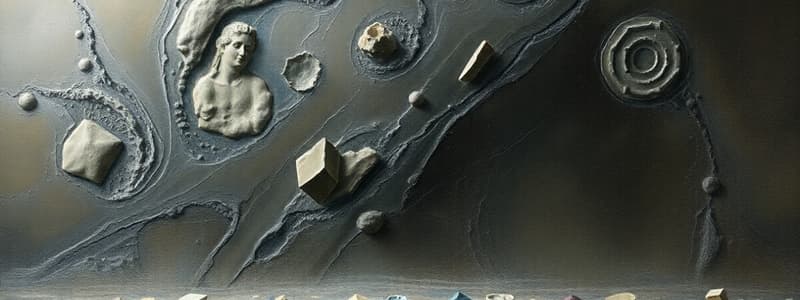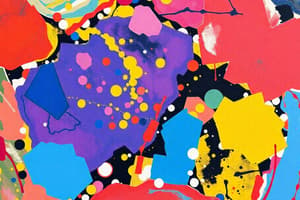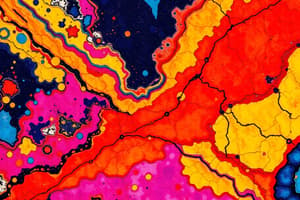Podcast
Questions and Answers
All minerals have the same color.
All minerals have the same color.
False (B)
The way a mineral reflects light is called luster.
The way a mineral reflects light is called luster.
True (A)
Cleavage refers to the way a mineral feels when touched.
Cleavage refers to the way a mineral feels when touched.
False (B)
A mineral with metallic luster looks shiny like a metal.
A mineral with metallic luster looks shiny like a metal.
Streak is always the same color as the mineral.
Streak is always the same color as the mineral.
What is the difference between cleavage and fracture in minerals?
What is the difference between cleavage and fracture in minerals?
Name two tools you can use to test a mineral's hardness.
Name two tools you can use to test a mineral's hardness.
Why is color alone not a reliable property for identifying minerals?
Why is color alone not a reliable property for identifying minerals?
What property is tested by rubbing a mineral on a porcelain tile?
What property is tested by rubbing a mineral on a porcelain tile?
Name three physical properties you can use to identify a mineral.
Name three physical properties you can use to identify a mineral.
Flashcards
Luster
Luster
A feature of a mineral that describes how shiny or dull it is, based on how it reflects light.
Scratch Test
Scratch Test
The test used to determine the hardness of a mineral by scratching it against known materials on the Mohs scale.
Streak
Streak
The color of a mineral's powder when rubbed against a streak plate.
Cleavage
Cleavage
Signup and view all the flashcards
Fracture
Fracture
Signup and view all the flashcards
Mohs Hardness Scale
Mohs Hardness Scale
Signup and view all the flashcards
Metallic Luster
Metallic Luster
Signup and view all the flashcards
Non-Metallic Luster
Non-Metallic Luster
Signup and view all the flashcards
Glassy Luster
Glassy Luster
Signup and view all the flashcards
Talc
Talc
Signup and view all the flashcards
Diamond
Diamond
Signup and view all the flashcards
Hardness test
Hardness test
Signup and view all the flashcards
Fracture
Fracture
Signup and view all the flashcards
Streak
Streak
Signup and view all the flashcards
Color
Color
Signup and view all the flashcards
Luster
Luster
Signup and view all the flashcards
Cleavage
Cleavage
Signup and view all the flashcards
Streak Plate
Streak Plate
Signup and view all the flashcards
Mohs Hardness Scale
Mohs Hardness Scale
Signup and view all the flashcards
Mineral
Mineral
Signup and view all the flashcards
Rock
Rock
Signup and view all the flashcards
Soft Mineral
Soft Mineral
Signup and view all the flashcards
Medium Hardness Mineral
Medium Hardness Mineral
Signup and view all the flashcards
Hard Mineral
Hard Mineral
Signup and view all the flashcards
Fracture
Fracture
Signup and view all the flashcards
Cleavage
Cleavage
Signup and view all the flashcards
Luster
Luster
Signup and view all the flashcards
Streak
Streak
Signup and view all the flashcards
Hardness
Hardness
Signup and view all the flashcards
Color
Color
Signup and view all the flashcards
Study Notes
Multiple Choice Questions
- Physical Property of Minerals: Hardness is a physical property of minerals.
- Luster Description: Luster describes a mineral's shininess or how it reflects light.
- Hardness Test: The scratch test is used to measure the hardness of a mineral.
- Mineral Powder Color: Streak refers to the color of a mineral's powdered form.
- Mohs Scale Use: The Mohs scale is used to determine a mineral's hardness.
- Cleavage Definition: Cleavage describes how a mineral breaks along flat surfaces.
Additional Questions
- Quartz Luster: Quartz has a glassy luster.
- Hard Mineral: Diamond is known for being very hard.
- Softest Mineral: Talc is the softest mineral on the Mohs scale.
- Mineral Hardness (Glass/Steel): If a mineral scratches glass but not steel, its hardness is 6.
- Color Reliability: Color alone is not a reliable way to identify minerals because impurities can affect color.
- Streak Test: The streak test determines the color of a mineral's powder.
- Mineral Identification Properties: Hardness, luster, color, streak, cleavage, and fracture are used to identify minerals.
Studying That Suits You
Use AI to generate personalized quizzes and flashcards to suit your learning preferences.




